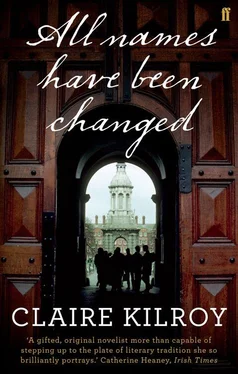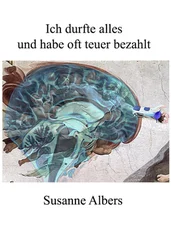Claire Kilroy - All Names Have Been Changed
Здесь есть возможность читать онлайн «Claire Kilroy - All Names Have Been Changed» весь текст электронной книги совершенно бесплатно (целиком полную версию без сокращений). В некоторых случаях можно слушать аудио, скачать через торрент в формате fb2 и присутствует краткое содержание. Год выпуска: 2010, Издательство: Faber & Faber, Жанр: Современная проза, на английском языке. Описание произведения, (предисловие) а так же отзывы посетителей доступны на портале библиотеки ЛибКат.
- Название:All Names Have Been Changed
- Автор:
- Издательство:Faber & Faber
- Жанр:
- Год:2010
- ISBN:нет данных
- Рейтинг книги:5 / 5. Голосов: 1
-
Избранное:Добавить в избранное
- Отзывы:
-
Ваша оценка:
- 100
- 1
- 2
- 3
- 4
- 5
All Names Have Been Changed: краткое содержание, описание и аннотация
Предлагаем к чтению аннотацию, описание, краткое содержание или предисловие (зависит от того, что написал сам автор книги «All Names Have Been Changed»). Если вы не нашли необходимую информацию о книге — напишите в комментариях, мы постараемся отыскать её.
All Names Have Been Changed — читать онлайн бесплатно полную книгу (весь текст) целиком
Ниже представлен текст книги, разбитый по страницам. Система сохранения места последней прочитанной страницы, позволяет с удобством читать онлайн бесплатно книгу «All Names Have Been Changed», без необходимости каждый раз заново искать на чём Вы остановились. Поставьте закладку, и сможете в любой момент перейти на страницу, на которой закончили чтение.
Интервал:
Закладка:
The Blake invocation was of central significance. That Glynn based his sixth novel, The Devil’s Party, loosely around the life of William Blake has already been mentioned. Despite its eighteenth-century setting, Glynn acknowledged in a radio interview that The Devil’s Party was his most autobiographical work. ‘To date,’ he added tantalisingly.
The radio signal did not broadcast the wink we agreed he almost certainly appended. A great man for the winks, no more than his protagonists, leaving you neither here nor there. Was it all a big joke, or what? Is that what he was trying to tell us? He enjoyed toying with people, pulling their legs, seeing how far he could push them. You could practically hear him gearing up sometimes, cracking his knuckles, flexing his digits, rolling up his sleeves. I do not wish to reduce him to a series of ludicrous traits, merely acknowledge that he had more than a few. Which of us is without flaws? Vanity was Glynn’s great weakness. No portrait of the man would be complete without a reference to his ego, which he dragged around like a ball and chain. It stunted his progress, begat the funny walk. That’s why he got on so famously with us: we worshipped him, plain and simple.
Of his eight novels, The Devil’s Party was our favourite, and not just because the main character was a writer. Antonia cited an early minor work, Gorsefire, as her favourite, just to be obtuse, but The Devil’s Party was the one she could quote at length, as I lost no time in reminding her. On the inscription page was an extract from Blake’s great prose work, The Marriage of Heaven and Hell: ‘The reason Milton wrote in fetters when he wrote of Angels and God, and at liberty when of Devils and Hell, is because he was a true Poet and of the Devil’s party without knowing it.’
A key element of the Glynnian endeavour fell into place while I was sitting out there on the corridor, concerning the iconography of evil. Glynn did not publicly admire Blake because it was safe to — Blake was well dead and therefore no longer posed a threat to his ball-and-chain ego, which, though cast in heavy metal, was as fragile as glass. It is a sorry indictment, Antonia had more than once pointed out to us, that most male writers would rather choke than praise the competition. No, Glynn admired the poetics of Blake for the same reason that Blake admired the poetics of Milton, namely, for its depiction of badness. Milton infamously evoked evil not as a deviation, but as human. The mind of Lucifer was more accessible than the mind of God. It was divinity he found remote.
A distinctive characteristic of Glynn’s work was his use and reuse of the same four rogues throughout the eight novels. Not half enough has been made of this in the academic domain. Glynn’s protagonists encounter the same villains over and over, from novel to novel, as if trapped on the same carousel. There was Malachy, P.J., the Dogman, Flood. All four featured in The Devil’s Party, lifted from fifties parish-pump-politics Ireland and transplanted wholesale to Georgian England, unchanged but for their outlandish and anachronistic period costumes with which Glynn clearly amused himself (cod pieces, skullcaps, cuckolds’ horns). They played marginal, inessential roles, neither advancing the plot nor developing the characterisation, hardly needing to be there at all, really, from a technical point of view. The Dogman was merely sketched into a crowd scene, little more than a leering flash of teeth, yet distinct as a painter’s signature.
Seen from this perspective, Glynn’s approach is comparable in its symbolisation of evil to that of the British medieval mystery plays. Belsabub, Sattan. Bonus Angelus et Malus Angelus. Diabolus I and II. Stock characters, waiting in the wings to posture and speak their lines with an ironical sneer before retiring to loiter backstage until the next novel gets underway. Not that this was a simplistic vision, far from it. It was rather an insight into the absolute intimacy Glynn felt with evil. He knew his demons on a first-name basis. Their commerce was almost neighbourly.
Evil was a local occurrence. It ran into you in the bookies, shot past you in the backseats of taxis. In Farm Animals, the narrator, O’Dea, reads about the Dogman in the court pages of a regional newspaper whilst sitting in the waiting room of a dental surgery in Gorey, queuing to get a rotten molar extracted. Entirely coincidental, spotting the Dogman’s mugshot like that — O’Dea would have preferred to scan the GAA fixtures, but the scrofulous young fella with the scabby kneecaps had appropriated the sports section.
That Glynn referred to his villains as he might the weather — that is, in passing — leads the perceptive reader to draw the conclusion that Glynn had drawn the conclusion that one can never escape one’s demons but must instead learn to live with them. So he turned them into background figures: Malachy, the Dogman — Diabolus I and II, thus rounding off his moral universe, the depth and complexity of which was renowned. Personify the bastards: oldest trick in the book. Finally, I’d spotted one of his invisible wires.
‘Would you fucking keep it down?’ Antonia snapped at me.
I wasn’t aware that I’d opened my mouth. ‘Sorry,’ I said sarcastically. Inside Glynn’s room, something hit the wall and shattered. Glass. Aisling had been jabbing at a carpet tile with the tip of her biro, trying to slay it, but she looked up at the sound of this crash.
‘You’ve interrupted him,’ she said darkly.
The lock on Glynn’s door disengaged, and he pulled it open to find the five of us sitting on the corridor floor. He glared down at us, frog-faced, dog-jowled, then stepped over our limbs without comment, none too steady on his feet. From that low angle, the distension of his gut was hard to miss. His trousers were buttoned tightly under it, the straining waistband pushed down around the groin where his girth was narrowest.
Aisling jammed her foot in the door just before it clicked shut. The others didn’t notice. They had climbed to their feet to traipse after Glynn, stiff as passengers disembarking from a long-haul flight. Aisling looked at me, wordlessly rotating the magnifying glass suspended from her neck. The second the others rounded the corner out of sight, we slipped inside. It was almost dark by then.
Glynn’s office had the stifling pall of a sickroom. He’d been holed up in there for some time, possibly overnight. The most extraordinary booze-fumes polluted the air, and a cigarette smouldered in the overflowing ashtray. Aisling dived on something.
‘It’s here,’ she said. ‘Jesus Christ!’
‘What?’
‘His red notebook.’ I must have frowned my ignorance. ‘ The red notebook,’ she clarified. I still didn’t know what she was talking about.
She held it up briefly before placing it on his desk to rifle through the pages. I got to work on the contents of the wastepaper basket. We worked quickly in the gloom, unable to turn on the lights as the staff in the offices opposite would see what we were up to. Shards of glass crunched underfoot — the remnants of a whiskey bottle, judging by the gold foil collar, and not one of Glynn’s crystal trophies, as we’d feared. Another whiskey bottle was stashed in the wastepaper basket, buried beneath a snowdrift of crumpled paper balls. The bottle was drained. I smoothed the paper balls out one by one on the floor. On the top of each page was scrawled a single scored-out word. Storm, fire, funeral ; that sort of thing. I can’t remember the others. They added up to nothing. Anyone could have written them. I crumpled the pages up again and tossed them back in the bin.
I took down his Collected Works of Blake to find a bottle of Baby Power’s pressed hard against the back of the bookcase, its hands raised in surrender, caught in the act. This bottle too was empty. I removed Paradise Lost. Getting harder to read the titles in the dusk. A naggin of Bushmills, not a drop in it. I started unshelving volumes at random. Whiskey bottles riddled Glynn’s bookcase like dental cavities, like shadows on his lungs.
Читать дальшеИнтервал:
Закладка:
Похожие книги на «All Names Have Been Changed»
Представляем Вашему вниманию похожие книги на «All Names Have Been Changed» списком для выбора. Мы отобрали схожую по названию и смыслу литературу в надежде предоставить читателям больше вариантов отыскать новые, интересные, ещё непрочитанные произведения.
Обсуждение, отзывы о книге «All Names Have Been Changed» и просто собственные мнения читателей. Оставьте ваши комментарии, напишите, что Вы думаете о произведении, его смысле или главных героях. Укажите что конкретно понравилось, а что нет, и почему Вы так считаете.












